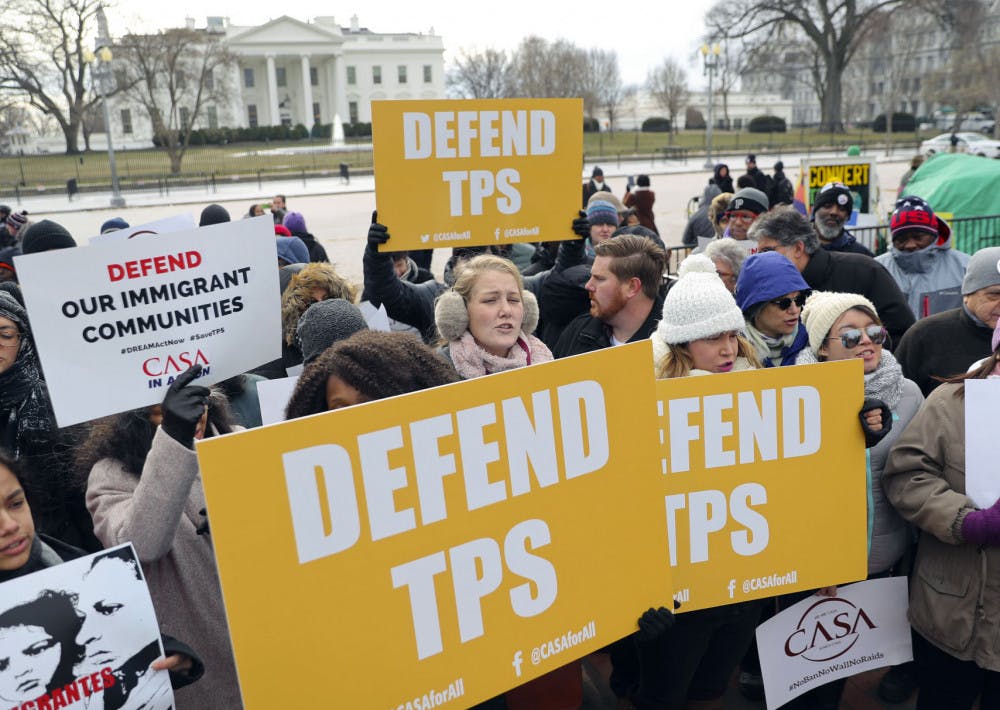For Venezuelan students at the University of Florida, the uncertainty surrounding Temporary Protected Status is a heavy burden, bringing deep emotional challenges as they grapple with what lies ahead.
TPS was created by the federal government to provide work permits and temporary legal protection to citizens of certain countries facing humanitarian crises such as natural disasters or internal conflict, according to Laura dePaz Cabrera, founding attorney of dePaz Cabrera Immigration Law in Gainesville.
President Donald Trump’s administration announced on Feb. 1 it will end TPS for Venezuelans under the 2023 designation, allowing them to work legally until April 7, while those covered by the 2021 designation have until Sept. 10, according to the Federal Register.
Currently, more than 300,000 Venezuelans are protected under the 2023 status. Although an extension is possible, Cabrera anticipates a decision will not be known until early summer.
Even with temporary status granted, recipients do not have a direct pathway to permanent residency. There are no legal mechanisms for Venezuelans unless they have another legal avenue, such as a family- or employment-sponsored application, according to Cabrera.
“It’s designed to be temporary, and it’s designed to prevent people from having to return to a country where the conditions are not ideal, but it’s never meant, by definition, to be a permanent solution,” Cabrera said.
For Venezuelans relying on TPS, Cabrera recommended staying informed about available options. Since eligibility varies based on individual circumstances, she emphasized the importance of understanding case-specific factors.
Sofia Ricci, a 21-year-old microbiology junior, said the changes to TPS are deeply personal. Her roommate’s cousin, a UF graduate working in Miami, now faces the reality of having just 30 days before he must leave the country.
“It’s disgusting, and it completely disregards human rights,” Ricci said. “He spent years studying and working toward a future here, and now it’s being stripped away overnight.”
Ricci said she believes the issue is not only political but humanitarian. The U.S. Government is leaving Venezuelans unprotected from conditions in their home country, she said.
She highlighted UF’s Venezuelan Student Association and local Venezuelan-owned businesses, such as Tinker Latin Food, as sources where students can find community and support.
However, Ricci said she believes there needs to be more awareness and discussions on campus.
Jose Peaguda, a 22-year-old biomedical engineering junior, fears the end of TPS puts his loved ones’ future at risk. He moved to Miami at 16, hoping to achieve the “American dream.” With the protected status set to expire, he said, everything his family has built in the U.S. is at risk.
“Everything that we have sacrificed in order to find the opportunity to get a better and new life outside of the dictatorship and all the corruption that has been happening in Venezuela for approximately 25 years is all going to waste,” Peaguda said.
Peaguda described the mental toll the situation has taken on him, making it difficult for him to focus in his daily life.
He also struggles with feelings of hopelessness as repression in Venezuela continues, often fearing he may never experience a free Venezuela again, Peaguda said.
Peaguda sees this issue as one that affects the entire Hispanic community. While he recognizes that there are both positive and negative aspects to immigration, he emphasized that many immigrants are people striving to build a better life in the U.S.
Ultimately, he hopes that Venezuelans will find a voice and solution.
Ricci and Peaguda believe UF should provide more support for the Venezuelan community, especially given that nearly 50% of Fall 2023 degree-seeking undergraduate students were Hispanic, according to UF Institutional Planning and Research. They hope UF will offer more professional resources to help students cope with these changes.
Contact Amanda Roman at aroman@alligator.org. Follow her on X @mandy_romannn.
Amanda Roman is a sophomore sports journalism major and the Spring 2025 women's basketball reporter. This is her second semester at the sports desk for The Alligator, and she previously interned for Fort Lauderdale United FC. In her free time, she enjoys lifting, shopping and reading.






